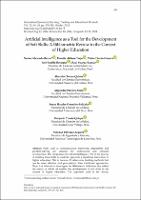| dc.contributor.author | Alvarado-Bravo, Nestor | |
| dc.contributor.author | Aldana-Trejo, Florcita | |
| dc.contributor.author | Durán-Herrera, Víctor | |
| dc.contributor.author | Rasilla-Rovegno, José | |
| dc.contributor.author | Suarez-Bazalar, Raul | |
| dc.date.accessioned | 2025-02-27T22:43:33Z | |
| dc.date.available | 2025-02-27T22:43:33Z | |
| dc.date.issued | 2025-02-27 | |
| dc.identifier.uri | https://hdl.handle.net/20.500.13067/3693 | |
| dc.description.abstract | Skills such as communication, teamwork, adaptability and problem-solving are essential for professional and personal development. The integration of artificial intelligence (AI) in the process of building these skills in students represents a significant innovation in higher education. This is because AI offers new teaching methods that can be more effective and personalized than traditional approaches. Thus, it is relevant to investigate the bibliometric indicators that reflect the trends in which AI enables the development of soft skills in the context of higher education. The approach used is the mixed, exploratory-descriptive level. The total number of studies reviewed was 78, all of them extracted from the Scopus database. The results show that the most prevalent thematic areas are “Communication skills development”, “Teamwork and collaboration” and “Critical thinking and problem-solving”. This is a result of AI’s ability to create more personalized, interactive and adaptive learning environments. However, it is concluded that scientific production in this field of study is still developing and requires greater attention from researchers. It is important to reflect that the implementation of AI in higher education must be supported by policies that regulate its effective integration and maximize its impact. Future studies should employ systematic reviews to address the impact of AI on soft skills according to the area of knowledge, such as engineering, social sciences or health sciences, identifying the skills to which AI is contributing most significantly. | es_PE |
| dc.format | application/pdf | es_PE |
| dc.language.iso | eng | es_PE |
| dc.publisher | International Journal of Learning, Teaching and Educational Research | es_PE |
| dc.rights | info:eu-repo/semantics/openAccess | es_PE |
| dc.rights.uri | https://creativecommons.org/licenses/by-nc-nd/4.0/ | es_PE |
| dc.subject | Soft skills | es_PE |
| dc.subject | Artificial intelligence | es_PE |
| dc.subject | University students | es_PE |
| dc.subject | Bibliometric review | es_PE |
| dc.title | Artificial Intelligence as a Tool for the Development of Soft Skills: A Bibliometric Review in the Context of Higher Education | es_PE |
| dc.type | info:eu-repo/semantics/article | es_PE |
| dc.identifier.journal | International Journal of Learning, Teaching and Educational Research | es_PE |
| dc.identifier.doi | https://doi.org/10.26803/ijlter.23.10.18 | |
| dc.subject.ocde | https://purl.org/pe-repo/ocde/ford#5.01.00 | es_PE |
| dc.publisher.country | PE | es_PE |
| dc.source.volume | 23 | es_PE |
| dc.source.issue | 10 | es_PE |
| dc.source.beginpage | 379 | es_PE |
| dc.source.endpage | 394 | es_PE |


